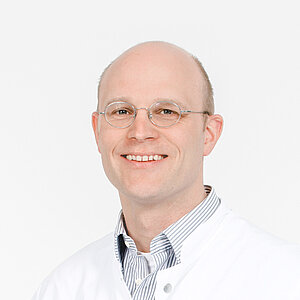Your health is very important to us, including after your treatment. One parameter we use to measure treatment success is our patients’ quality of life, which is why we will ask you to answer our research questions at regular intervals.
Aftercare following radical prostatectomy
Staying safe after being discharged
Following your stay with us, the urologist treating you will organise your aftercare regime. If you experience any issues immediately after being discharged and cannot reach the doctor treating you (e.g. due to holiday or at the weekend), you can contact the Martini-Klinik during the day or, if you have issues overnight or at the weekend, visit the Emergency department at the University Medical Centre Hamburg-Eppendorf (UKE). The Emergency department has urologists on duty around the clock. After being discharged, it will take some time for your body to fully recover from the treatment. Feeling exhausted and less resilient in the first few weeks is completely normal.
What to expect after surgery
After undergoing a prostatectomy, we strongly recommend that all patients engage in tumour aftercare.
Monitoring your PSA level is an important part of this aftercare. PSA is usually produced in the prostate. However, once the prostate has been removed, this level should fall towards zero. (The exact value can vary depending on the laboratory conducting the tests, as they may have different detection limit values). You should expect your PSA level to fall to zero after three months. If, despite the surgery, prostate carcinoma cells are still present in the body, such as because tumour cells have spread beyond the prostate, these would then produce PSA. Your urologist will carry out this blood test, urine tests and monitor changes to your bladder and urethral sphincter.
We recommend having the following tests and arranging check-ups at the following intervals:
- Medical examination / laboratory tests (PSA level)
- In the first two years: every three months
- In the third and fourth years: every six months
- After five years: every twelve months
- X-rays, CT scans, scintigraphy: only if necessary
- Ultrasound: if recommended by your urologist
These are only rough guidelines. Your urologist will adjust the dates of your check-ups to your personal situation. Please do not hesitate to contact us if you have any questions or comments following your stay at the Martini-Klinik.
Prof. Dr. Markus Graefen
Recommendations for adjuvant radiotherapy following radical prostatectomy
Data on the indications for adjuvant radiotherapy, especially in conjunction with hormone therapy, remains very much in flux. We therefore revise our recommendations at regular intervals in line with the latest findings and insights. You can view our current recommendations for adjuvant radiotherapy following radical prostatectomy, based on post-surgical histology, in the following table.
Providing your data for research purposes
We want to know how you’re doing, whether it’s weeks, months or years after undergoing treatment with us.
Has the treatment helped you? Did you experience any side effects? How would you assess your quality of life? At the Martini-Klinik, these questions form a central part of our patient aftercare and also help us to continuously improve the quality of our treatments. In addition, by answering our questions, you will be making a significant contribution to scientific research into prostate carcinoma and the development of treatments.
We have been continuously building and developing the Martini-Klinik database, which forms the basis of our scientific work, for more than 30 years. Many of our research findings have already brought about a better understanding of prostate carcinoma and thereby helped to improve diagnosis and treatment of the disease. However, despite all the advances achieved to date, further research will be required to finally find a cure for advanced prostate cancer in the future, and perhaps even prevent cancer from occurring in the first place.
How can you support us?
If you give your consent during your stay with us, we will include you in our online patient survey. You will then receive a questionnaire via email one month before your treatment, four weeks after your treatment, six months after your treatment and on an annual basis thereafter.
We would be delighted if you could support our research. This is the only way we can offer innovative diagnostic techniques and treatments for future patients to improve their quality of life and their chances of recovery.
